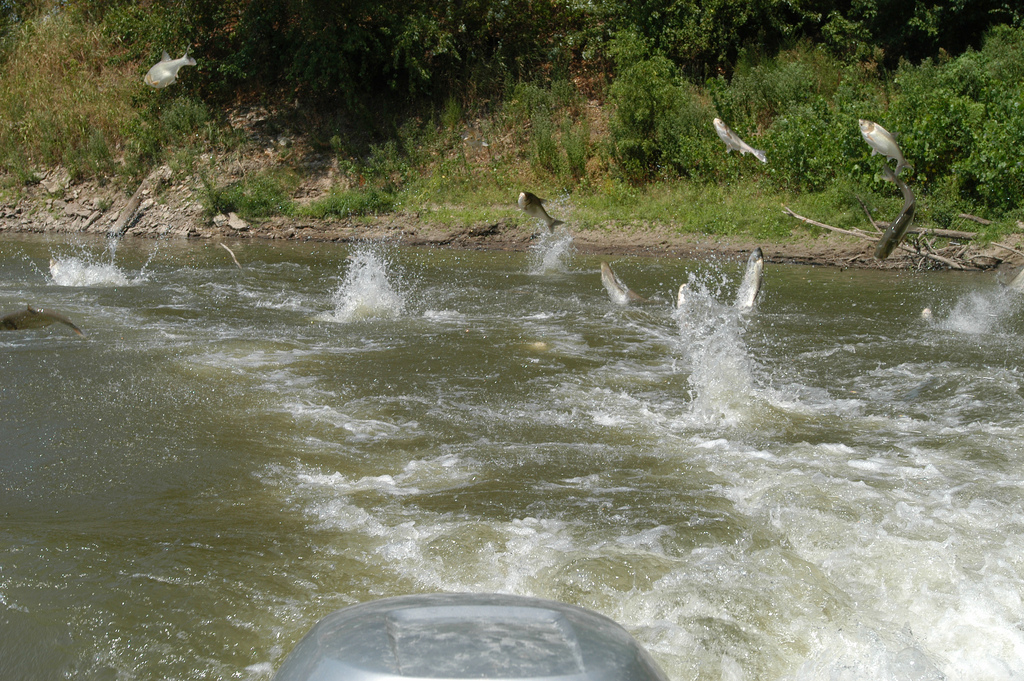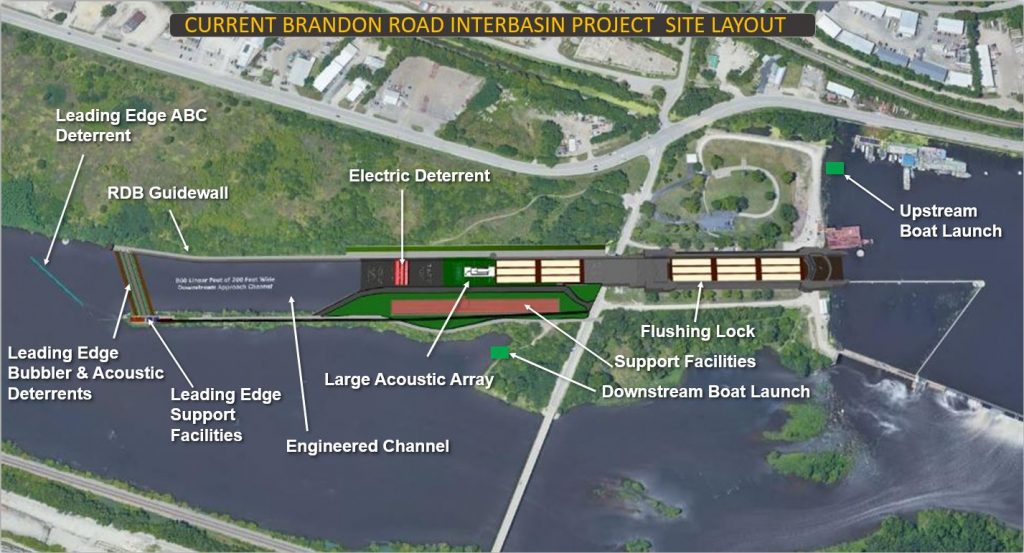Agreement Advances $1.15 Billion Project to Keep Invasive Carp Out of Great Lakes
Potential invasion threatened multi-billion dollar fishing and recreational boating industries.

School of Jumping Silver Carp. Photo by Jason Jenkins. (CC BY 2.0)
Illinois has signed a key agreement with the state of Michigan and U.S. Army Corps of Engineers that will advance a $1.15 billion project to keep invasive carp out of the Great Lakes.
The agreement announced Monday devotes $274 million in federal funding, as well as $114 million in state money, for construction of the project at the Brandon Road Lock and Dam along the Des Plaines River in Joliet, Illinois.
Col. Aaron Williams, commander of the Corps’ Rock Island District, said in a statement that it’s been working with Illinois and Michigan to move the project forward.
“We are excited to be entering this next phase of the project and are committed to preventing the upstream movement of invasive carp and other aquatic nuisance species into the Great Lakes,” Williams said.
The invasive fish were first introduced to the southern United States in the early 1960s and 1970s, according to the U.S. Fish and Wildlife Service. Known for their ability to leap from the water when disturbed, invasive carp threaten the $7 billion fishing industry and $15 billion recreation boating industry on the Great Lakes. “Wisconsin is excited that the Brandon Road project is progressing and stands ready to help the project move along,” said Wade Strickland, director of the Office of Great Waters with the Wisconsin Department of Natural Resources.

The current layout of a $1.15 billion project to install measures that seek to deter invasive carp from passing through the Brandon Road Lock and Dam on the Des Plaines River in Illinois. Photo courtesy of the Rock Island District of the U.S. Army Corps of Engineers
The fish has been known to outcompete native species because they can consume almost half of their body weight in food each day. Titus Seilheimer, fisheries specialist with Wisconsin Sea Grant, said that raises concerns that invasive carp could change the food web if they become established in Lake Michigan. The fish feed on algae and zooplankton, and he noted invasive species like quagga mussels have already filtered out a lot of algae in the lake. That means less zooplankton, which means less food for little fish.
Cody Kamrowski, executive director of the Wisconsin Wildlife Federation, hailed the commitment of Illinois Gov. J.B. Pritzker to protect the Great Lakes.
“We’re still going to have to be vigilant, and we’re still going to have to educate the public because there’s still a risk of somebody transporting them,” Kamrowski said. “But this project is a huge positive step in the right direction.” Last month, 40 groups urged the Illinois governor to sign an agreement with Michigan and the Army Corps to move the project forward, including Clean Wisconsin, the National Wildlife Federation, and the Alliance for the Great Lakes.
Live invasive carp have been found just miles from Lake Michigan and beyond barriers in the Chicago Area Waterway System, which connects Lake Michigan with the Mississippi River via the Lower Des Plaines and Illinois rivers.
Molly Flanagan, chief operating officer with the Alliance, said no evidence of a breeding population exists above the Brandon Road Lock and Dam so far.“We have this chance to keep the invasive carp from moving any closer to Lake Michigan, which is why this choke point in the system is so important – why getting this agreement signed was so important,” Flanagan said. “We don’t want to waste any more time on getting construction started.”
While the vast majority of the project will be federally funded, Illinois and Michigan shared 10 percent of the project’s cost.“Protecting the Great Lakes is not an undertaking that any one state or city can tackle alone, and I’m thrilled that we were able to forge a path that protects both the Great Lakes and ensures Illinois taxpayers do not shoulder a disproportionate share of the burden,” Pritzker said in a statement.
With an agreement in hand, the Army Corps plans to solicit contracts to begin work on the project in the coming weeks. The first phase of the project is expected to take three years to build, and construction may last up to eight years if there is sufficient funding.
Agreement signed to advance work on keeping invasive carp out of the Great Lakes was originally published by Wisconsin Public Radio.
If you think stories like this are important, become a member of Urban Milwaukee and help support real, independent journalism. Plus you get some cool added benefits.






















Why isn’t Wi a partner in this effort?
Oh, this ship has sailed. They’ve found carp DNA in a small river parallel to the Ship Canal which often co-mingles during heavy rain/thaw flooding events. The carp reaching the Great Lakes is a when-not-if scenario.